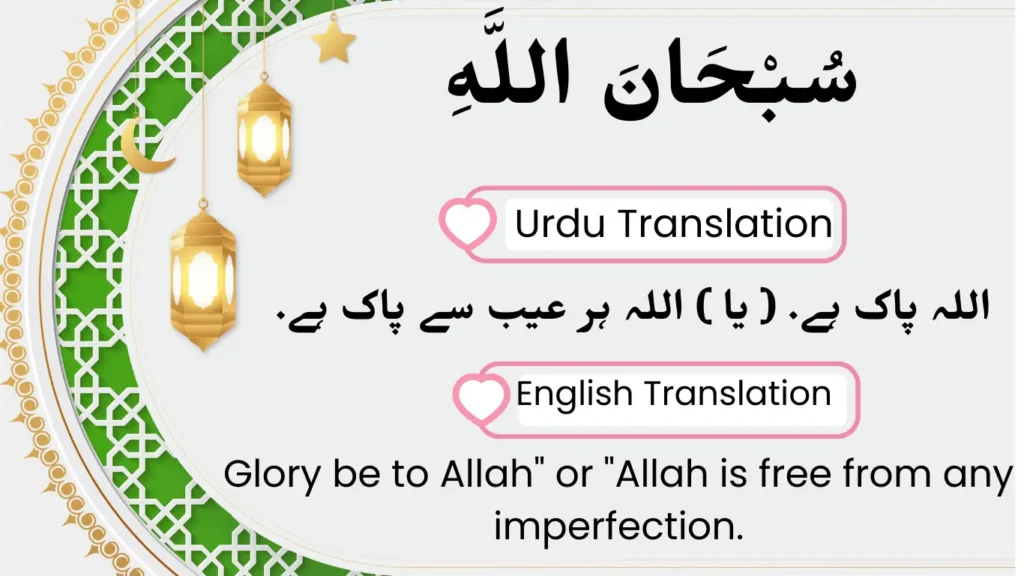In the Islamic faith, phrases of glorification and praise for Allah hold great significance. Among them, Subhanallah stands as one of the most frequently recited. The phrase is not just a word of praise but a powerful reminder of the greatness, purity, and majesty of Allah.
What Does “Subhanallah” Mean?
The word Subhanallah is an Arabic expression that can be broken down into two parts:
- Subhana (سُبْحَانَ) – which means “Glory be” or “to declare someone free from imperfections.”
- Allah (اللَّهِ) – the name of the Almighty Creator.
Together, Subhanallah translates to “Glory be to Allah” or “Allah is free from any imperfection.” It signifies that Allah is flawless, free from all defects, and beyond any human weakness.
Subhanallah Meaning in Urdu (سبحان اللہ کا مطلب)
In Urdu, Subhanallah means:
- “اللہ پاک ہے”
- “اللہ ہر عیب سے پاک ہے۔”
These translations reflect the same essence as in Arabic, praising Allah for His purity and flawlessness. Reciting “Subhanallah” is a simple yet profound way to glorify Allah in daily life, reinforcing a connection with the Divine.

Significance of Reciting Subhanallah
Muslims often recite Subhanallah in prayers and daily life as a form of glorification and remembrance of Allah. Its importance is emphasized in several Hadiths (sayings of the Prophet Muhammad PBUH), where it is described as a means to seek forgiveness, earn rewards, and show gratitude to Allah.
- Spiritual Purification: By saying Subhanallah, believers acknowledge that only Allah is perfect and that human beings, with their imperfections, rely on His mercy.
- Fulfills an Act of Worship: The constant remembrance of Allah (Dhikr) brings peace to the heart, fulfilling the spiritual need of staying connected with the Creator.
- Multitude of Rewards: Reciting Subhanallah holds immense reward. In a Hadith, Prophet Muhammad (PBUH) mentioned, “Whoever recites Subhanallah wa bihamdihi (Glory be to Allah and Praise Him) 100 times a day, his sins will be forgiven even if they are as much as the foam of the sea.” (Sahih Bukhari)
The Usage of Subhanallah in Daily Life
Muslims use Subhanallah in various situations:
- Expressing Awe: When witnessing something beautiful or extraordinary, Muslims recite Subhanallah to glorify the Creator of all things.
- Reflecting on Creation: The phrase is often used when marveling at nature or contemplating the intricate balance of life.
- Acknowledging Allah’s Perfection: It is also recited during prayers, especially in Ruku (bowing) and Sujood (prostration), where the greatness of Allah is recognized.
Related Words and Synonyms to Subhanallah
While Subhanallah is a unique phrase, there are other forms of glorification in Islam that convey similar meanings:
- Alhamdulillah (الحمد لله) – “All praise be to Allah.”
- Allahu Akbar (الله أكبر) – “Allah is the greatest.”
- La ilaha illallah (لا إله إلا الله) – “There is no god but Allah.”
These phrases are often recited together in Tasbih, a form of remembrance of Allah (Dhikr).
Conclusion
Reciting Subhanallah is more than just a verbal affirmation; it is a way of life, acknowledging the beauty, perfection, and majesty of Allah. It serves as a reminder that, despite human imperfections, believers can turn to Allah for guidance, forgiveness, and support. Understanding the meaning of Subhanallah in Urdu enriches one’s spiritual connection and deepens the appreciation of Allah’s flawless nature.
Make it a habit to say Subhanallah daily, and embrace its profound meaning with every utterance.
FAQs:
Subhanallah in Urdu means “اللہ پاک ہے” or “اللہ ہر عیب سے پاک ہے,” which signifies that Allah is free from all flaws and imperfections.
You can say Subhanallah at any time, especially when witnessing something awe-inspiring, during prayers, or when reflecting on Allah’s creation and greatness.
Reciting Subhanallah brings numerous spiritual benefits, including earning rewards, seeking forgiveness, and strengthening your connection with Allah. Prophet Muhammad (PBUH) encouraged its recitation to purify one’s heart and soul.




